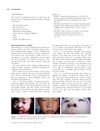
Nanoformulations improve luteolin's effectiveness as a cancer treatment.
 July 2024 in “Journal of Cosmetic Dermatology”
July 2024 in “Journal of Cosmetic Dermatology” Vegan collagen builder improves hair growth, skin smoothness, and reduces wrinkles and pain.
June 2024 in “jurnal ABDIMAS Indonesia” Vitamin D education and supplementation improve hair health in the elderly.
 March 2024 in “Animal nutrition”
March 2024 in “Animal nutrition” Adding both soluble and insoluble fibers, especially beet pulp, to the diet of pregnant sows helps improve their health and the growth of their piglets in hot weather.
August 2023 in “Fermentation” Scientists can use engineered microbes to make L-aspartate and related chemicals, but there's still room to improve their efficiency.
January 2022 in “Indian journal of paediatric dermatology” Children with early graying hair might have lower levels of certain nutrients like zinc, magnesium, and Vitamin B12.
 January 2022 in “International Journal of Medical Sciences”
January 2022 in “International Journal of Medical Sciences” Cedrol may be an effective treatment for colorectal cancer.
July 2021 in “Anais brasileiros de dermatologia/Anais Brasileiros de Dermatologia” Monilethrix causes different levels of hair loss in family members.
 January 2020 in “Kocatepe Tıp Dergisi”
January 2020 in “Kocatepe Tıp Dergisi” Not all hair loss patients need lab tests; patient history and physical exams are key to deciding who does.
 January 2020 in “Journal of Cosmetics, Dermatological Sciences and Applications”
January 2020 in “Journal of Cosmetics, Dermatological Sciences and Applications” DEEPLY ROOTED® supplement seems to effectively improve hair growth and quality in women with no side effects.
January 2023 in “Journal of Clinical and Diagnostic Research” Microneedling with PRP is as effective and safe as minoxidil+finasteride for treating hair loss.
January 2018 in “Our Dermatology Online” Dutasteride injections can help hair growth in androgenic alopecia but need more research for long-term use.
 July 2023 in “bioRxiv (Cold Spring Harbor Laboratory)”
July 2023 in “bioRxiv (Cold Spring Harbor Laboratory)” Chitosan slows root hair growth and causes a buildup of callose at low concentrations, but at high concentrations, it only inhibits growth without callose buildup.
 18 citations,
December 2010 in “Journal of Trace Elements in Medicine and Biology”
18 citations,
December 2010 in “Journal of Trace Elements in Medicine and Biology” Women with AGA have more androstenedione and dihydrotestosterone, less copper and zinc; copper imbalance affects AGA; treatment improves hormones and minerals.
 27 citations,
April 2020 in “Journal of Experimental Botany”
27 citations,
April 2020 in “Journal of Experimental Botany” Glutathione helps Arabidopsis roots adapt to low phosphate by regulating a specific growth pathway.
 4 citations,
December 2013 in “International Journal of Dermatology”
4 citations,
December 2013 in “International Journal of Dermatology” Three children with nasal fungal infections were successfully treated with potassium iodide and sometimes itraconazole.

research Acne
231 citations,
April 2005 in “The New England Journal of Medicine” Acne affects most teenagers and can continue into adulthood, with various treatments available that show improvement but have concerns like antibiotic resistance and side effects.
 195 citations,
July 2005 in “American Journal of Human Genetics”
195 citations,
July 2005 in “American Journal of Human Genetics” Genetic variation in the androgen receptor gene mainly causes early-onset hair loss, with maternal inheritance playing a key role.
 45 citations,
January 1998 in “Dermatology”
45 citations,
January 1998 in “Dermatology” Some skin conditions look like acne but are caused by drugs, and they usually get better when the drug is stopped.
 27 citations,
December 2015 in “Mayo Clinic Proceedings”
27 citations,
December 2015 in “Mayo Clinic Proceedings” The document concludes that lifestyle changes and medical treatments can significantly reduce symptoms of Hidradenitis Suppurativa, a chronic skin condition.
 24 citations,
June 2021 in “Agronomy”
24 citations,
June 2021 in “Agronomy” Protein hydrolysates applied to roots or leaves differently improved lettuce yield and quality, with the best results seen in specific combined treatments for each type.
 22 citations,
April 1998 in “Dermatologic Clinics”
22 citations,
April 1998 in “Dermatologic Clinics” Interferons are effective for some skin conditions and cancers, but can have side effects and need more research for optimal use.
 20 citations,
June 2014 in “BMC genomics”
20 citations,
June 2014 in “BMC genomics” Poplar seed hairs grow from the placenta at the ovary base, with endoreduplication playing a key role in their development, and share similar cellulose synthesis processes with cotton fibers.
 13 citations,
October 2010 in “Pharmacogenomics”
13 citations,
October 2010 in “Pharmacogenomics” Researchers found that most genes affecting drug responses are not fully covered by commercial SNP chips, suggesting the need for more comprehensive tools to optimize drug selection based on genetics.
 6 citations,
April 2023 in “Frontiers in plant science”
6 citations,
April 2023 in “Frontiers in plant science” Certain bacteria can boost lentil growth and improve soil used for farming.
 6 citations,
February 2023 in “Plant and Soil”
6 citations,
February 2023 in “Plant and Soil” Bacillus subtilis strain WM13-24 helps plant root growth through volatile compounds.
 6 citations,
October 2020 in “Journal of Cellular and Molecular Medicine”
6 citations,
October 2020 in “Journal of Cellular and Molecular Medicine” 3D culture helps maintain hair growth cells better than 2D culture and identifies key genes for potential hair loss treatments.
 5 citations,
January 2022 in “PloS one”
5 citations,
January 2022 in “PloS one” Deleting the p63 gene in certain cells causes problems in thymus development and severe hair loss in mice.
 5 citations,
March 2017 in “Natural Product Research”
5 citations,
March 2017 in “Natural Product Research” Researchers found eight natural compounds and essential oils in the Italian plant Bituminaria basaltica, which are typical for its genus and known for bioactivity.
 4 citations,
February 2021 in “Nano select”
4 citations,
February 2021 in “Nano select” MSC-Exos can aid organ development and offer therapeutic benefits for various conditions.
























